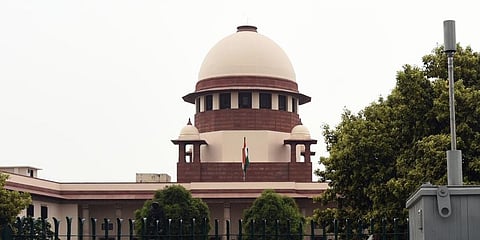

NEW DELHI: The Supreme Court Thursday cancelled the bail granted to a student leader in Madhya Pradesh, whose banners were put up in the local area celebrating his release in a rape case.
A three-judge bench headed by Chief Justice N V Ramana noted that the sole ground on which bail has been granted by the high court is the delay on the part of the appellant/complainant in lodging the FIR, without offering any plausible explanation for the same.
The top court said the discretion by courts in deciding a bail application must be exercised after due application of the judicial mind and not in a routine manner.
"This Court has held that very cogent and overwhelming circumstances are necessary for cancellation of bail and bail once granted, should not be cancelled in a mechanical manner. It is equally true that an unjustified or perverse order of bail is vulnerable to interference by the Superior Court," the bench, also comprising Justices Krishna Murari and Hima Kohli, said.
The counsel for the complainant had argued that "the bail order deserves to be set aside as he has a previous criminal history and also his blatant conduct subsequent to release for which reference has been made to his photographs appearing in the social media with his snapshots prominently displayed on posters/hoarding in the forefront with the faces of some influential persons of the society in the backdrop, welcoming him with captions like 'Bhaiyaa is back, 'Back to Bhaiyaa', and 'Welcome to Role Janeman (sweetheart)".
The top court said that even if it is assumed that the posters in question were not contemporaneous to his release from detention, the captions tagged to his photographs on the social media highlight the superior position and power wielded by him and his family in the society and its deleterious impact on the appellant/complainant.
"The emojis of crowns and hearts tagged with the captions quoted above are devoid of any religious sentiments sought to be portrayed by respondent No.2 (accused). On the other hand, they amplify the celebratory mood of the respondent No.2 and his supporters on his having been released from detention in less than two months of being taken into custody for a grave offence that entails a sentence of not less than ten years that may even extend to life.
"The brazen conduct of the respondent No.2 has evoked a bona fide fear in the mind of the appellant/complainant that she would not get a free and fair trial if he remains enlarged on bail and that there is a likelihood of his influencing the material witnesses," the bench said.
The apex court also noted that a representation has also been submitted by the appellant's father to the Superintendent of Police, District Jabalpur expressing the very same apprehension.
"In view of the aforesaid facts and circumstances, we are of the considered opinion that the respondent No.2 does not deserve the concession of bail. Relevant material brought on record has been overlooked by the High Court while granting him bail.
"The supervening adverse circumstances referred to above, also warrant cancellation of bail. Accordingly, the impugned order is quashed and set aside and respondent No.2 is directed to surrender within one week from the date of passing of this order. It is however clarified that the observations made above are confined to examining the infirmity in the impugned order granting bail to the respondent," the bench said.
The FIR alleged that the accused committed sexual intercourse with the girl, a major, on various occasions over three years after falsely promising to marry her.
He was arrested in September last year.
The high court granted bail saying that the accused was not required to be kept in custody during the entire trial period.
The accused had contended in the high court that he had a consensual relationship.